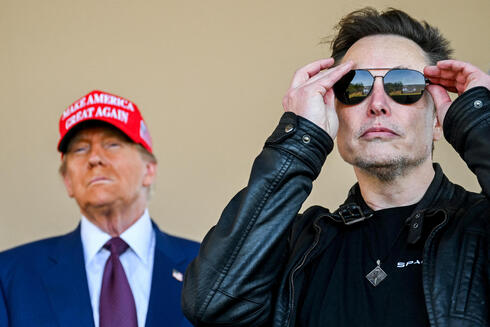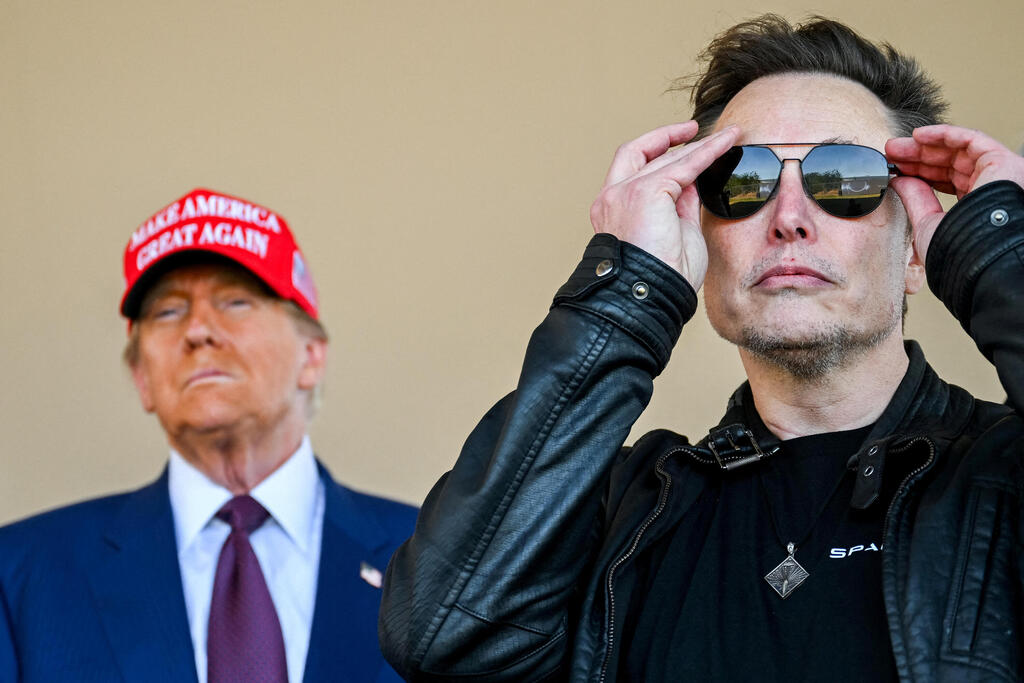
From Mars to Mar-a-Lago: Elon Musk’s political takeover
Why the billionaire's growing influence on Trump’s presidency signals a dangerous new reality.
On New Year's Eve, Elon Musk sat in a tuxedo at the Mar-a-Lago estate in Florida, scrolling through his phone screen in boredom. In the background, a gala event was taking place in honor of the incoming year 2025. Behind him, the President-elect of the United States, Donald Trump, danced to the tunes of the Village People’s YMCA in his familiar style: elbows close to his body, palms clasped and raised, and his lower body moving to the beat of the music. Suddenly, Musk seemed to wake up, began nodding to the song, and finally stood up and joined in the dance. Perhaps unwittingly, it was a rare show of power, in which the richest man in the world danced alongside the most powerful man in the world, just before they began to make the world dance to their tunes.
Dancing alongside Trump wasn’t just a gesture. It signaled a shift in Musk’s approach, who has traditionally been averse to authority but has recently increasingly embraced populist leaders around the world. The close bond between the two controversial figures has become an extraordinary source of strength for both of them—but especially for Musk.
“Let me tell you: we have a new star. A star is born—Elon. He’s a very special guy. He’s a super-genius,” Trump said in a speech after his victory in the presidential election, spending several minutes praising the multi-billionaire. Shortly afterward, he announced Musk’s appointment as “efficiency czar” in his new administration—a role that is shaping up to be an unofficial version of a shadow vice president.
Thus begins a new chapter in the 21st century, in which a tech oligarch with enormous media, economic, and political influence becomes a key figure in the domestic and international arena, even though he has never been elected to public office. What will Musk do with this power? Can a man worth over $400 billion, a private citizen with a superhero complex and an addiction to drama, be trusted to act for the greater good?
Musk answered this question immediately after the gala ended, when he decided to welcome the new year with a flurry of tweets about Britain. In what appeared to be an intervention for the sake of disruption, he posted a tweet on X with the call for “Prison for Starmer” against Prime Minister Keir Starmer, whose center-left party came to power in Britain last summer. Musk accused the Labour government of preventing an investigation into a gang rape by British Pakistanis and claimed that those in positions of power are involved in a cover-up.
In another tweet, he wrote, “Starmer was deeply complicit in the mass rapes in exchange for votes. That’s what the inquiry would show.” And from there he turned to posting a poll on X asking should the U.S. “liberate the people of Britain from their tyrannical government.” The British health minister criticized Musk, saying that as an American citizen, maybe he should focus on issues on the other side of the Atlantic. Starmer himself responded by saying that those who spread false information are not interested in the victims but in themselves.
This was not the first time Musk has interfered in British politics. A year ago, he tweeted that “civil war is inevitable.” But Britain is just one example of a broader trend: the billionaire is using his personal position and the X network he owns to influence political processes in the international arena. True, Musk is not the first to do this, and tycoons in the past have sought to influence elections, shape political borders, interfere in legal systems, and promote foreign leaders. In the 19th century, the Rockefeller family leveraged their wealth to maintain their advantage in the energy sector, particularly by financing political candidates and preventing laws that could threaten their industry. The Koch brothers have worked aggressively in recent decades to prevent environmental legislation and corporate taxation.
3 View gallery


Supporters of AfD party in Berlin demonstrate against Muslim immigrants, 2018.
(Photo: AP)
But in the digital age, Musk’s power is spreading faster and more widely than ever. He attacks the left, the right, and—with chaotic energy backed by enormous legitimacy, billions of dollars, and millions of followers on social media—he is working to build an informal transatlantic coalition of extremist politicians. Why? Maybe simply because he can.
Even Trump has invited Musk to participate in his meetings with foreign leaders. In December, Musk accompanied the president-elect to the reopening of Notre Dame Cathedral in Paris, then met with him and French President Emmanuel Macron. In New York, he joined Trump in a meeting with Italian Prime Minister Giorgia Meloni. On another occasion, he took part in a phone call with Ukrainian President Volodymyr Zelensky.
With confidence comes appetite
From here, Musk only grew more confident. In Germany, without any provocation or apparent reason, Musk began to express open support for the far-right AfD party. First, on December 19, he tweeted his support, and then followed up with an opinion column published in the German press, in which he referred to the party—known for its neo-Nazi connections—as "the last spark of hope." He added: “Portraying the AfD as far-right is clearly false, considering that Alice Weidel, the party’s leader, has a same-sex partner from Sri Lanka! Does that sound like Hitler to you? Come on!”
If that wasn’t enough, and to further promote the AfD ahead of the snap elections expected next month, Musk announced he would host Weidel for a live conversation on the X network, similar to the broadcast he held with Trump last August at the height of the U.S. election campaign.
The German government was forced to respond, a testament to the power Musk has amassed. It accused him of attempting to directly influence the election. In an official statement, a government spokesman sought to downplay the billionaire’s words: “The normal people, the sensible people, the decent people are far in the majority in this country,” he said. “We act as if Mr Musk's statements on Twitter could influence a country of 84 million people with untruths or half-truths or expressions of opinion. This is simply not the case.”
Chancellor Olaf Scholz, whom Musk called a “fool,” was more blunt: “The rule is: don’t feed the troll.” Musk was unimpressed. He also managed to find time to support Canadian Conservative Party leader Pierre Poilievre, who is expected to run for prime minister in this year’s election, as well as express support for the far-right Italian government.
In July, Musk opened a front against Venezuela following the re-election of President Nicolás Maduro in a controversial election that was challenged by the United States and other countries. Musk declared that Maduro had lost, describing him as a “clown,” a “fool,” and a “dictator.” In response, Maduro reacted angrily, challenging him to a fighi, which Musk accepted.
This was not Musk’s only intervention in South American politics. In April, Musk directed his attention to Brazil’s justice system and began systematically attacking the Supreme Court judge involved in the investigation into former President Jair Bolsonaro’s role in the January 2023 attack on the congressional building, presidential palace, and Supreme Court. Musk referred to the judge as “Brazil’s Darth Vader” and called for his resignation or impeachment while promoting theories of electoral fraud that allegedly led to the victory of leftist President Luiz Inácio Lula da Silva.
Meanwhile, Musk has had business interests in Argentina since 2022, when one of Tesla’s main lithium suppliers (a critical component in electric vehicle batteries) announced a $1.1 billion investment in the country. Musk has since shown consistent interest in Argentina’s political system, praising the anarcho-capitalist president Javier Milei. The two have developed a close relationship: after Musk endorsed Milei in the presidential race, the president-elect spoke with him after his victory. In April, Musk hosted Milei at Tesla’s Texas factory, and the two met again in November—this time in Florida, alongside President-elect Trump.
Musk’s consistent intervention in international politics, especially in the Northern Hemisphere, has not gone unnoticed. Alongside Starmer and Scholz, Norwegian Prime Minister Jonas Gahr Støre also criticized him: “I find it worrying that a man with enormous access to social media and huge economic resources involves himself so directly in the internal affairs of other countries,” he said.
It is worth noting the cautious way in which leaders of great powers treat Musk, even when they criticize him. For example, Macron, who even tried to flatter Musk by inviting him to the reopening of Notre Dame. Musk has not yet directly intervened in the French elections, but Macron’s response to his intervention in Germany sounded defensive: “Ten years ago, who would have imagined that the owner of one of the world’s largest social networks would be supporting a new international reactionary movement and intervening directly in elections, including in Germany,” Macron said in a speech.
A power that challenges governments
Musk’s audacity is jaw-dropping but not misplaced. He already enjoys significant influence over the domestic politics of the world’s greatest power, even before Trump is sworn in as president.
Last month, when the U.S. Congress was preparing to pass a budget bill to avert a government shutdown, Musk tweeted more than 150 times (!) against the proposal on the X network. “Any member of the House or Senate who votes for this outrageous spending bill deserves to be voted out in 2 years!” he declared. He called the bill “a crime” and warned that it must not pass.
Musk tweeted — and Republican members of Congress listened. The proposal failed.
This was not the first time Musk had demonstrated power beyond that of his own government. In early 2022, he provided Ukraine with access to satellite communications via Starlink, SpaceX’s network of tiny communications satellites. Starlink allowed the Ukrainian military to plan attacks and defend itself against Russia.
Over time, Musk’s support for Ukraine became hesitant, and he moved to leverage his newfound power position. In October 2022, Musk published a poll on the X network proposing new maps for a “peace agreement,” including the granting of Crimea to Russia.
But Musk didn’t stop at politics; he sought money, too. Musk approached the Pentagon, demanding more than $120 million by the end of the year and nearly $400 million over the next year or he would shut down Starlink services in Ukraine. It resembled the tactics of drug dealers, who provide the first dose for free to create dependency.
Ignorance and lack of knowledge of details
The Biden administration will soon be history, and Elon Musk is already acting as if he holds the reins of power. The Republican Party has marched—and seems set to continue marching—in his wake, not guided by facts but by his sheer influence. Ironically, the proposal ultimately approved by Congress was not fundamentally different from the one Musk had vehemently opposed, yet he praised it nonetheless. In his numerous tweets on the subject, Musk displayed a surprising ignorance of basic budgetary details. Among other things, he made erroneous claims about congressional pay raises, the financing of a stadium in Washington through taxes, and the implications of a government shutdown for public services.
This was not the first time Musk revealed a lack of understanding of political and constitutional basics. Criticizing the political situation in Britain, he called on King Charles to dissolve the government and declare an election—powers that the British monarch does not hold. When he accused Prime Minister Keir Starmer of incompetence in handling the issue of Pakistani gangs, Musk overlooked that Starmer had actually led the initial investigations into the matter. And when he claimed that elections in Brazil were rigged, he ignored the fact that there was no credible evidence of such claims.
In the era of fake news and alternative facts, most American lawmakers might not pay attention to every online provocateur. However, when that individual owns a social media platform capable of spreading misinformation and enjoys an unusual degree of closeness to the president-elect, it becomes harder to ignore their influence.
Musk’s closeness to Donald Trump deepened significantly in the lead-up to the last election. How much? Consider the $277 million Musk poured into Trump’s campaign in just three months—a sum that tightened their relationship considerably.
And what about Trump? While the president-elect has always enjoyed the company and financial backing of wealthy individuals, Musk’s wealth and global influence are not new. These factors alone do not fully explain the growing closeness between the two, especially given their initial animosity.
In the summer of 2022, Trump openly mocked Musk on his platform, Truth Social, writing: “When Elon Musk came to the White House asking me for help on all of his many subsidized projects, whether it's electric cars that don't drive long enough, driverless cars that crash, or rocket ships to nowhere, without which subsidies he'd be worthless, and telling me how he was a big Trump fan and Republican, I could have said, 'drop to your knees and beg,' and he would have done it…”
But Musk did not kneel. Instead, he acquired a kind of power that aligns perfectly with Trump’s taste: an attention machine capable of generating chaos, spreading conspiracy theories, and amplifying lies. Musk achieved this through his acquisition of Twitter (now X) in October 2022 for $44 billion—a purchase initially seen as overvalued. Despite Musk’s attempts to back out of the deal, legal pressures forced him to go through with it.
On paper, Musk’s skepticism about the acquisition was justified. Twitter’s user base and revenue stagnated, and even after Musk fired 80% of its employees, the company continued to flirt with insolvency (or so Musk claims). Its value plummeted to an estimated $9 billion. Nevertheless, the deal was a bargain—not financially, but politically.
The acquisition gave Musk a powerful tool for shaping public opinion, spreading disinformation, and creating information chaos. This newfound influence did not go unnoticed by Trump. Musk’s $277 million campaign contribution was merely the icing on the cake.
Flattery as a political tool
Once Musk realized that cooperation with Trump would serve him better than insults, events progressed quickly. Musk mobilized his propaganda machine in support of Trump. In the month leading up to the election, Musk published over 3,000 posts on X endorsing the former president. These posts resonated with his 202 million followers and were amplified by algorithmic manipulation, which prioritized political content—especially pro-Trump messaging. An investigation by The Wall Street Journal revealed that X’s algorithm deliberately boosted posts and accounts aligned with Trump’s agenda.
Musk became a messaging juggernaut, sharing content that questioned the integrity of the election and propagated conspiracy theories about Kamala Harris, immigrants, women, and election observers. One particularly viral post on September 29 read: “If Trump is NOT elected, this will be the last election," Musk wrote. It garnered over 103 million views and was reposted nearly 180,000 times.
The strategy paid off. By August, Trump’s tone toward Musk had shifted dramatically. At a rally, he declared that he's in favor of electric cars. Following this statement on August 9, Tesla’s stock skyrocketed by over 100%, bringing the company’s valuation to an astonishing $1.9 trillion—more than the combined worth of the ten largest automakers globally. Musk’s wealth reached unprecedented levels, cementing his status as the richest man in modern history.
And this is just the beginning. Musk’s political influence stands to yield even greater financial returns once he assumes the role of “efficiency czar” in the new Trump administration. Much of Musk’s business activity depends on regulatory approval from U.S. agencies, which will likely be restructured under Musk’s proposed $2 trillion in government budget cuts. These cuts would involve slashing public services and expanding privatization.
Here’s a partial list of how Musk’s political clout could benefit his businesses:
- NASA subsidies and contracts for SpaceX.
- Federal Aviation Administration (FAA) approvals for Starlink satellite launches.
- Department of Transportation grants for electric vehicles.
- FDA decisions on Neuralink’s human trials.
- Federal Trade Commission (FTC) oversight of X.
When Trump promises that the U.S. will reach Mars, the subtext is clear: Musk will get the contract.
Will this relationship continue to deepen throughout Trump’s presidency, granting Musk even greater power? It’s too soon to say. Their alliance is both profound and precarious.
On one hand, Musk and Trump share traits: boundless self-confidence, disdain for institutions, and loyal fan bases that embolden them to act with impunity. Both view concentrated power in their hands as a solution to public problems.
On the other hand, their similar egos and temperaments could spark future clashes. Furthermore, their ideological differences—Musk’s commitment to unfettered markets versus Trump’s preference for tariffs and trade restrictions—may create tension.
One thing is certain: starting January 20, the Musk-Trump connection will profoundly shake the world and reshape it in unprecedented ways.















